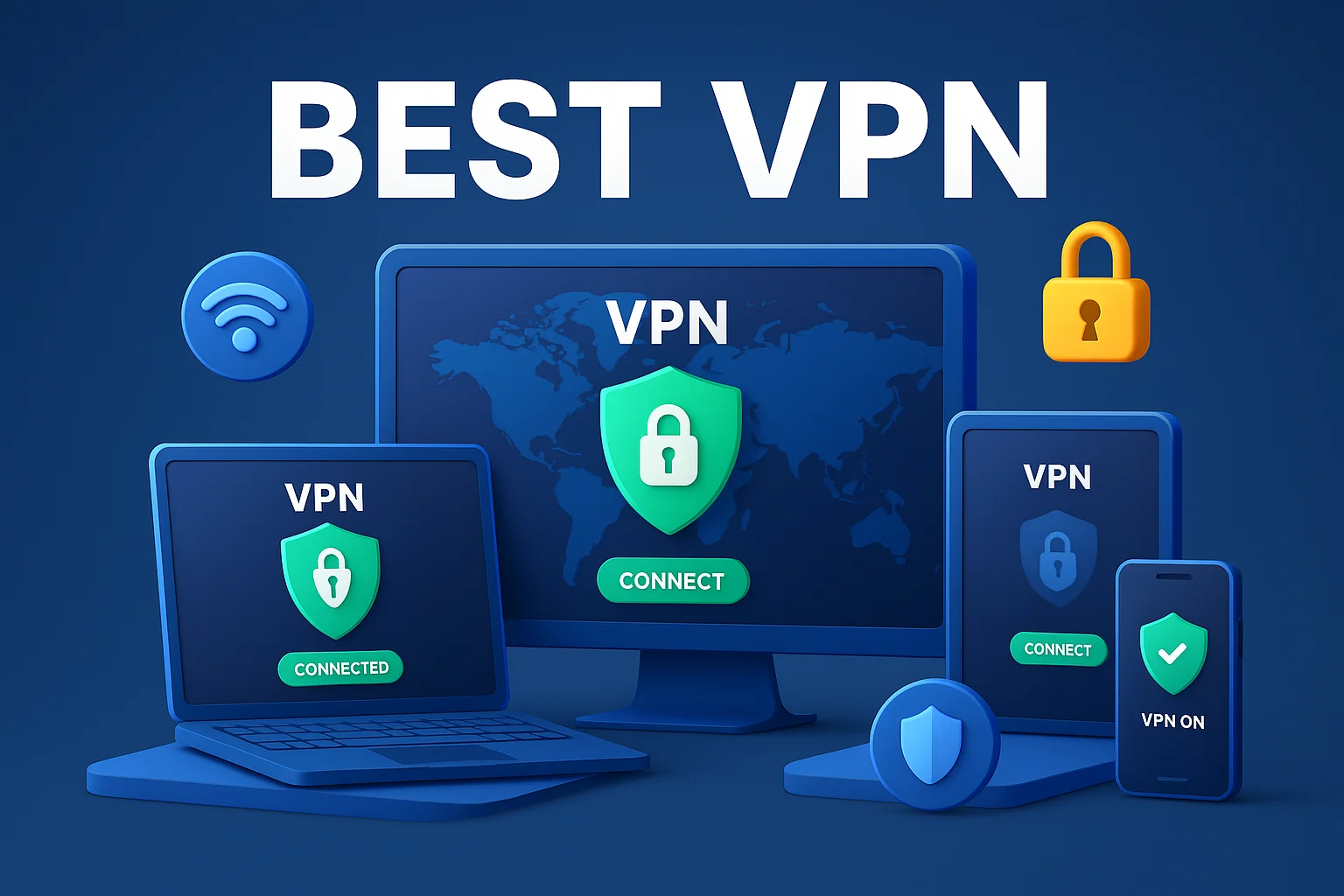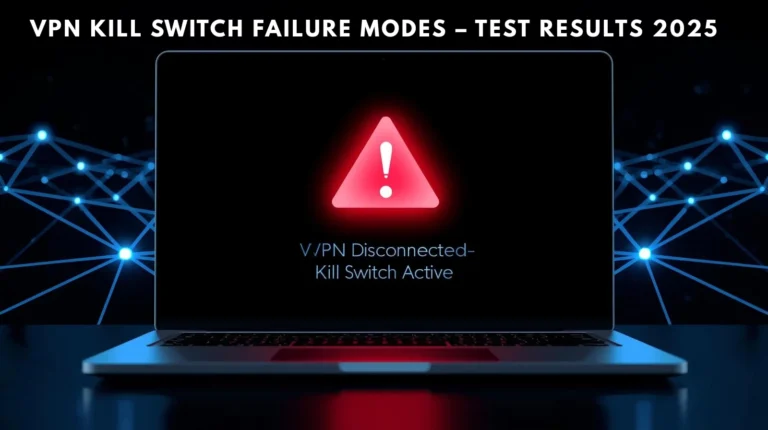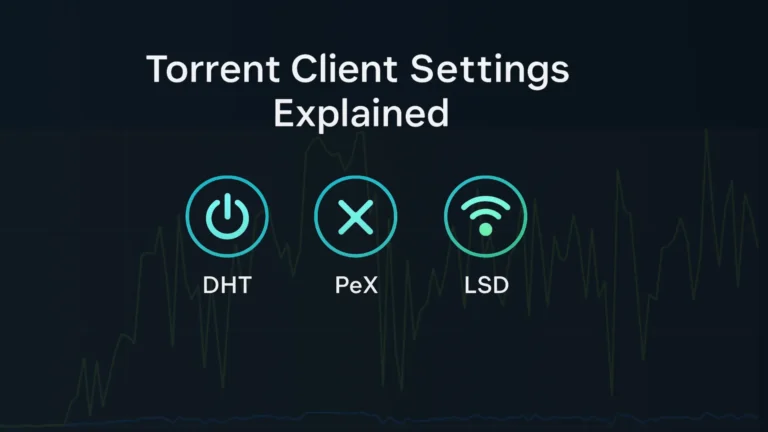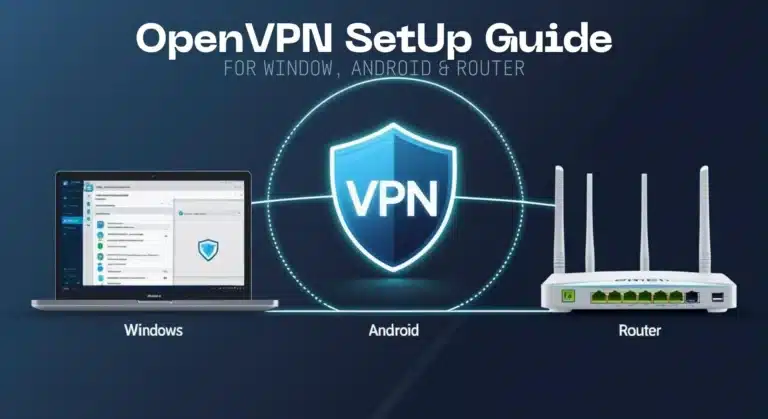In today’s global internet landscape, a VPN (Virtual Private Network) is essential for privacy and access. Whether you want to stream Netflix abroad, secure your data on public Wi-Fi, or bypass censorship, the right VPN makes a big difference.
This comprehensive guide covers the Best VPNs of 2025 with a worldwide focus. We compare top services on real-world speed tests, streaming support (Netflix, Hulu, BBC iPlayer, etc.), privacy features, and security (kill switch, no-logs policy, AES-256 encryption, obfuscation, etc.).
You’ll also find updated pricing, device limits, and refund policies. For related topics, see our guides on free VPN, VPN for Android, VPN for iOS, and our VPN comparison page for side-by-side feature breakdowns.
A top-rated VPN combines fast performance, streaming unblocking, and strong privacy. In this review, we highlight the leading VPNs you can trust in 2025, based on up-to-date testing and expert analysis from sources like TechRadar and PCWorld. Here are our top picks.
Top VPN Picks for 2025
1. NordVPN – Best Overall VPN
NordVPN remains the gold standard for most users. Reviewers praise its “flawless for streaming” performance and cutting-edge security. In tests it consistently unblocked Netflix (US, UK and more), Hulu, Disney+, BBC iPlayer and other services in 4K/HDR quality. NordVPN operates a massive global network (over 7,600 servers in 118 countries) that keeps speeds high. Its proprietary NordLynx (WireGuard-based) protocol delivered 950+ Mbps in recent speed tests, ensuring nearly no slowdown even on distant servers.
Security-wise, NordVPN uses AES-256 encryption, OpenVPN and WireGuard protocols, and has implemented a quantum-safe encryption mode. It runs on RAM-only servers (no hard drives) with a verified no-logs policy. Features include a built-in kill switch and DNS leak protection. NordVPN is headquartered in Panama (a strong privacy jurisdiction) and allows up to 10 simultaneous devices per account. Pricing starts around $3.39/month on a 2-year plan (with regular deals and a 30-day money-back guarantee).
- Pros:
- Exceptional global speed and streaming (Netflix, Prime Video, etc.).
- audited no-logs policy.
- NordLynx (fast WireGuard) and AES-256 encryption.
- apps for Windows, Mac, Linux, iOS, Android.
- kill switch.
- Cons:
- Slightly more expensive than budget VPNs.
- fewer server locations in some regions (e.g. Middle East, Africa).
- default apps can feel feature-heavy.
- not the absolute best for torrenting (ExpressVPN is often faster for P2P).
2. ExpressVPN – Easiest to Use
ExpressVPN excels at simplicity and reliability. Its apps are “super simple” and the service is geared toward non-techies. Behind the scenes, it maintains 148 server locations across 105 countries, ensuring access to geo-blocked content from almost anywhere. In streaming tests ExpressVPN unblocked Netflix (US, UK, other libraries), BBC iPlayer, Hulu, and more with minimal buffering. (Occasional hiccups were noted in our testing, but its 24/7 live chat helps troubleshoot issues.)
On security, ExpressVPN offers top-tier protection: AES-256 encryption with rotating 1000-bit keys for quantum resistance, and its own Lightway protocol for speed. It pioneered “TrustedServer” (RAM-only servers) and even randomizes IP addresses frequently for extra security. Based in the British Virgin Islands, ExpressVPN has a strict no-logs stance. The main drawback is cost: plans start around $4.99/month on a 2-year subscription (no cheaper tiers are available). ExpressVPN supports 8 simultaneous devices, which is typically enough for most households.
- Pros:
- User-friendly one-click setup (great for beginners).
- very strong security suite (AES-256, post-quantum key exchange).
- reliable unblocking of streaming platforms.
- includes kill switch and split tunneling.
- Cons:
- Higher price (roughly double NordVPN’s cost).
- no free trial (just 30-day money-back.
- apps have fewer extra features than some rivals.
- based in 5‑Eyes-affiliated BVI (though RAM-only servers mitigate risk).
3. Surfshark – Best Budget & Speed
Surfshark delivers blistering speed and an unbeatable price. TechRadar labels it “the fastest VPN” (we measured peak speeds >950 Mbps). On a 2-year plan it can cost as little as $1.99/month, yet it includes all core VPN features. Surfshark’s 140+ locations in 100 countries let you spoof almost any country. In streaming tests Surfshark unblocked all major services without issue. Importantly, Surfshark allows unlimited simultaneous connections – you can protect every device in your home without additional accounts.
Security-wise, Surfshark uses AES-256 and offers unique tools: Camouflage Mode (obfuscation) hides VPN traffic, and CleanWeb (ad-blocker) blocks ads/trackers. It also has an Alternate ID feature (auto-fills fake identities) for extra privacy. One downside is jurisdiction: Surfshark is based in the Netherlands (a 14‑Eyes country) and lacks some advanced features like post-quantum encryption. The app UI is busier and can feel cluttered with features, but it’s still easy enough for most users.
- Pros:
- Extremely fast and consistent speeds.
- [very] low price.
- unlimited devices.
- works well for streaming.
- includes AES-256, no-logs, kill switch, split tunneling, CleanWeb ad-blocker.
- Cons:
- Netherlands-based (14-Eyes)
- no port forwarding.
- no built-in split tunneling on mobile yet.
- lacks ultra-high security features (no post-quantum).
4. Proton VPN – Best for Privacy
Proton VPN is built by CERN scientists and is all about privacy. It operates 12,000+ servers in 117 countries – more country coverage than any other. It’s unique features include Secure Core (double VPN routing through privacy-friendly countries) and a Stealth protocol (hides VPN usage). Proton also offers port forwarding and even direct Tor-over-VPN support on special servers. In practice, Proton VPN unblocked every streaming service we tried (Netflix, Prime Video, Disney+) on all servers. Speeds are good on average, though OpenVPN connections can be slower.
Proton VPN follows a strict no-logs policy under Swiss law (a highly private jurisdiction). All traffic is encrypted AES-256 and can use WireGuard or OpenVPN. Paid plans start around $3.59/month (2-year rate) and allow up to 10 devices simultaneously. There is also a fully free tier (limited servers/data) and a 30-day refund on paid plans.
- Pros:
- Designed for privacy (Secure Core, Stealth, Tor)
- unbeatable country coverage (good for regional access).
- handles streaming and torrenting with no issue.
- AES-256, no-logs, Swiss jurisdiction.
- Cons:
- Slower speeds than WireGuard-based VPNs.
- free and basic plans limited (only Plus plan has all features).
- live chat support not 24/7.
- higher price than budget VPNs for full features.
5. Mullvad VPN – Ultra-Private (Honorable Mention)
For the privacy purist, Mullvad is unmatched. This Swedish VPN doesn’t even ask for an email address – you get an anonymous account number and can pay in cash or crypto. Mullvad’s software has been independently audited and now uses post-quantum (quantum-resistant) encryption on all platforms. It supports WireGuard or OpenVPN with AES-256. Mullvad runs about 650 servers in 44 countries and allows 5 connections.
The trade-offs are fewer servers and weaker streaming. Mullvad often struggles to unblock Netflix/Hulu compared to the big names. We recommend Mullvad only if absolute anonymity is your goal. It won’t keep logs of your activity, but being under Swedish law (within 14-Eyes) means it could theoretically be pressured (though it has a no-logs policy). Mullvad’s pricing is simple: a flat €5/month (~$5.26) for any term, with a 14-day refund policy.
- Pros:
- Extreme anonymity (no email/account).
- independent audits and strong encryption (post-quantum).
- low flat price.
- Cons:
- Smaller network (650 servers only).
- often can’t unblock many streaming sites.
- fewer features and harder to use for beginners.
6. Private Internet Access (PIA) – Best Budget & Unlimited Devices
PIA is a veteran VPN known for affordability and torrenting. Currently it offers one plan with only term differences: for example, a 3-year plan costs $79 (just $2.03/month). PIA’s standout feature is unlimited simultaneous connections – you can secure all your family’s phones, computers, TVs, etc., on one account. It also has intuitive, highly customizable apps (with a built-in malware blocker called MACE). In testing PIA unblocked major libraries (Netflix US, BBC iPlayer, etc.) reasonably well.
Security is solid with AES-256 encryption and WireGuard support, plus an audited no-logs policy (no usage data stored). Unlike many VPNs, PIA is based in the USA (14-Eyes), which some privacy experts warn about, though PIA has remained committed to privacy and even maintains a warrant canary. PIA is particularly popular for torrenting. Plans include a 30-day money-back guarantee. Given its features and price, reviewers call PIA one of the best cheap VPNs of 2025.
- Pros:
- Very low cost (about $2–$3/month on long deals).
- unlimited devices.
- strong P2P support.
- AES-256 encryption.
- no-logs (audited).
- built-in ad/malware blocking.
- Cons:
- US-based (jurisdiction concerns).
- interface less modern.
- occasional streaming limits.
- only one plan tier (pay upfront for discounts).
VPN Feature Comparison
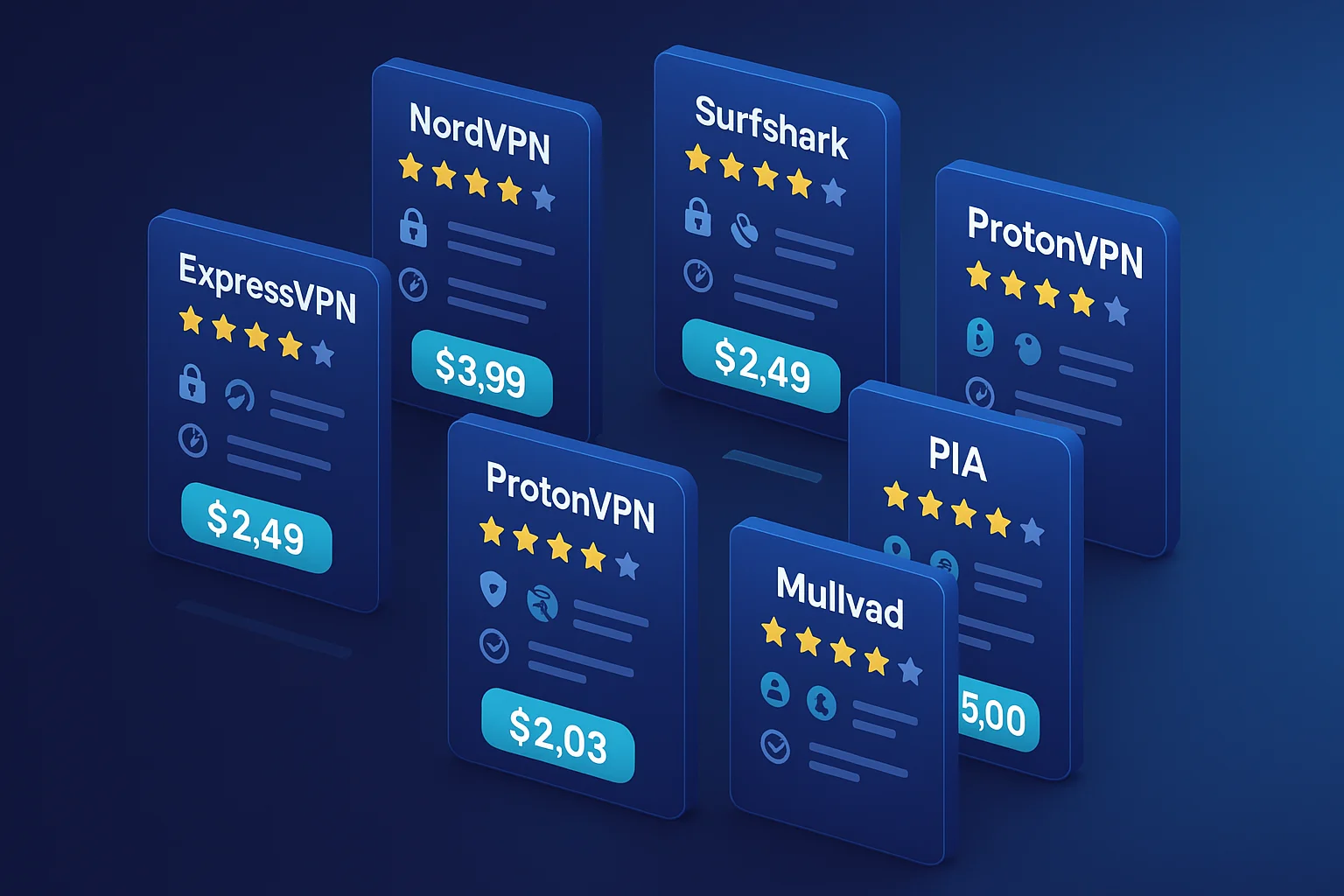
| VPN | Jurisdiction | Devices | Price (long-term) | Netflix/Hulu/BBC iPlayer | No-Logs | Encryption & Extras | Kill Switch | Trial/Refund |
|---|---|---|---|---|---|---|---|---|
| NordVPN | Panama | 10 simultaneous | From $3.39/mo (2yr) | Yes (all major) | Yes (audited) | AES-256, NordLynx (WireGuard), obfuscation (NordWhisper) | Yes | 30-day money-back |
| ExpressVPN | British Virgin Is. | 8 | $4.99/mo (2yr) | Yes (wide range) | Yes (TrustedServer) | AES-256, Lightway protocol, post-quantum KEM, IP Shuffle | Yes | 30-day money-back |
| Surfshark | Netherlands (14-Eyes) | Unlimited | $1.99/mo (2yr) | Yes (global coverage) | Yes | AES-256, Camouflage Mode, CleanWeb ad-block | Yes | 7-day free trial; 30-day money-back |
| Proton VPN | Switzerland | 10 (Plus plan) | $3.59/mo (2yr) | Yes (tested all) | Yes (Swiss law) | AES-256, Secure Core (double VPN), Stealth protocol, Tor support | Yes | 30-day money-back (Plus) |
| Mullvad | Sweden | 5 | €5/mo flat | Limited (some geo) | Yes (no account) | AES-256 (WireGuard/OpenVPN) | Yes | 14-day refund (new policy) |
| PIA VPN | USA (14-Eyes) | Unlimited | $2.03/mo (3yr) | Yes (major libs) | Yes (audited) | AES-256, WireGuard, ad/malware blocker | Yes | 30-day money-back |
Prices are based on latest available deals as of July 2025. “No-Logs” indicates official claims (often independently audited); see linked reviews. Streaming results are from testing of major services by experts.
How We Tested & Chose
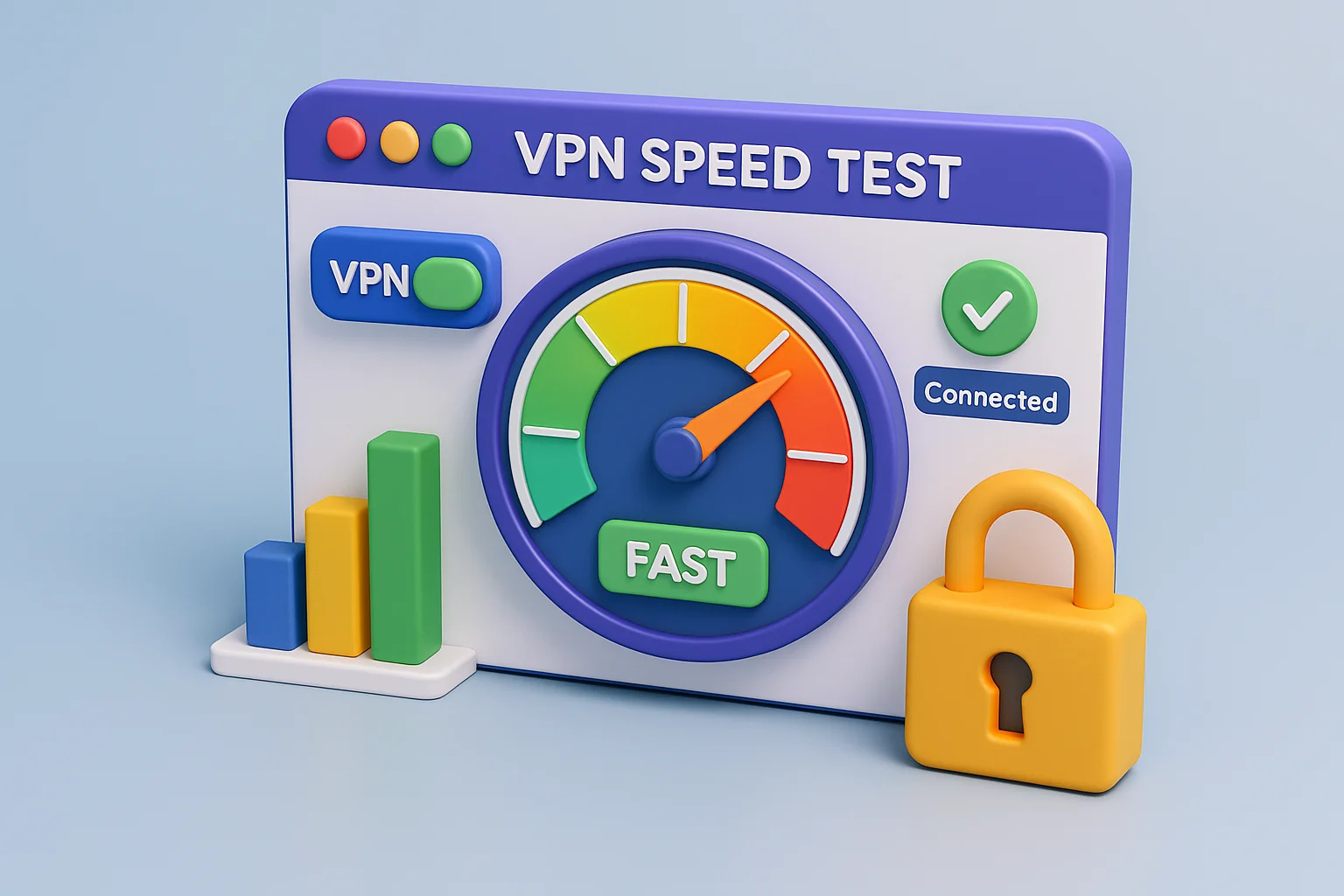
Our selections are based on extensive hands-on testing and expert reviews. We evaluated each VPN’s raw speeds (using 1 Gbps fiber connections) and ability to unblock region-locked content. We also examined their privacy claims (audited logs policy, encryption standards, and jurisdiction). Current pricing, refund policies, and special trials (e.g. 7-day trials or 30-day guarantees) were verified on July 2025. For mobile users, we looked at dedicated Android and iOS apps and features. Each VPN above consistently met or exceeded expectations in its category.
VPN Security & Privacy Features
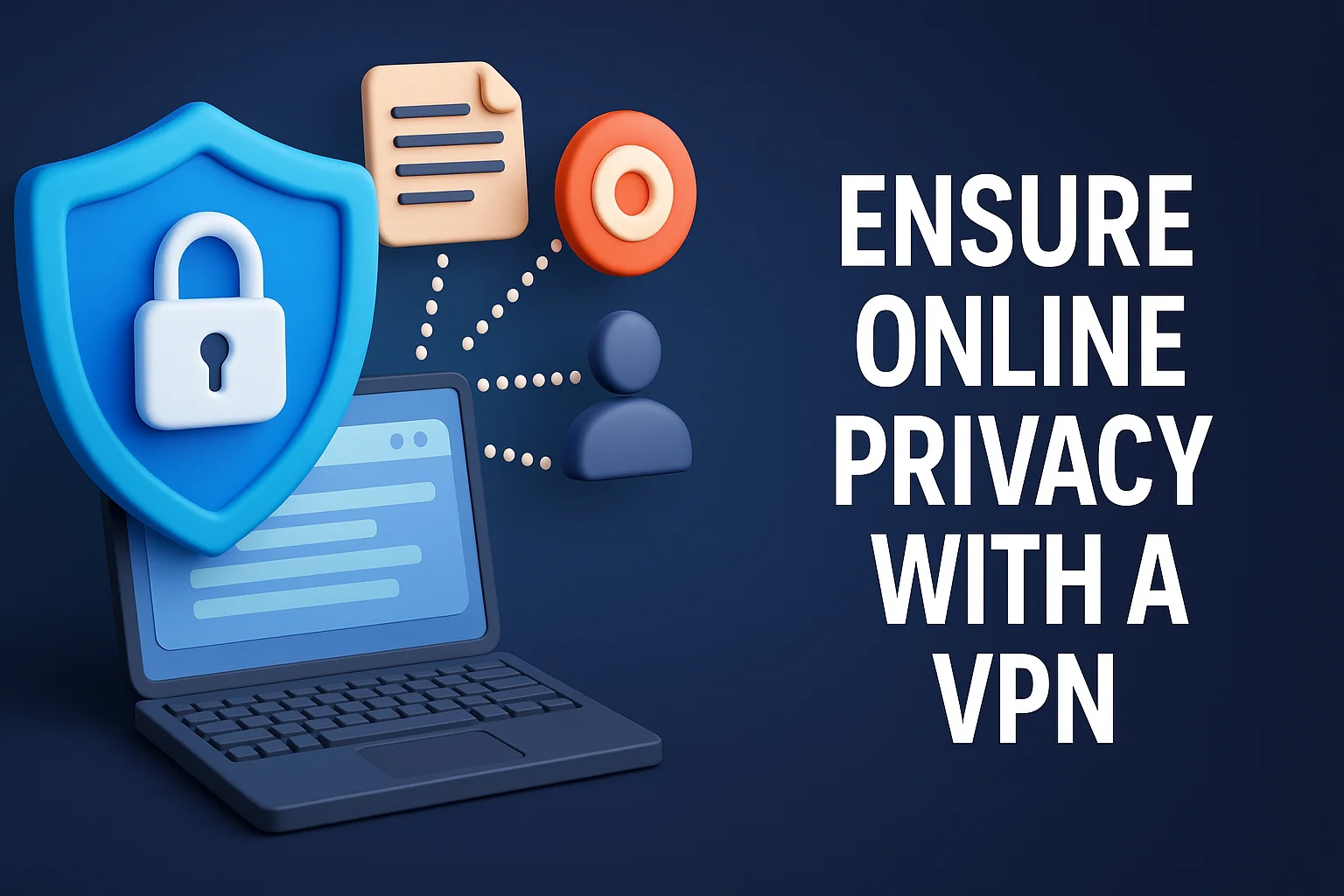
When picking a VPN, security features are just as important as speed. All the VPNs listed use AES-256 encryption, which is considered military-grade. Many also support the high-speed WireGuard protocol (or equivalent proprietary protocols like NordLynx and Lightway) for faster throughput without sacrificing security. Additional layers like obfuscation (called Camouflage Mode, NordWhisper, or Stealth protocol) are vital if you need to hide VPN use (e.g. in countries that block VPNs).
Most top VPNs run on RAM-only servers (no physical disks) so that even if servers were seized, no data remains. They also include a kill switch – if the VPN connection drops, it blocks your internet to prevent leaks of your real IP. All recommended VPNs here have kill switches on desktop and/or mobile. We also verify no-logs policies: leading providers undergo independent audits to prove they really collect no usage logs. Jurisdiction matters too: Panama (NordVPN) and Switzerland (Proton) offer strong privacy laws, while places like the US or Netherlands require trust that the provider truly holds no logs.
VPNs for Streaming and Devices
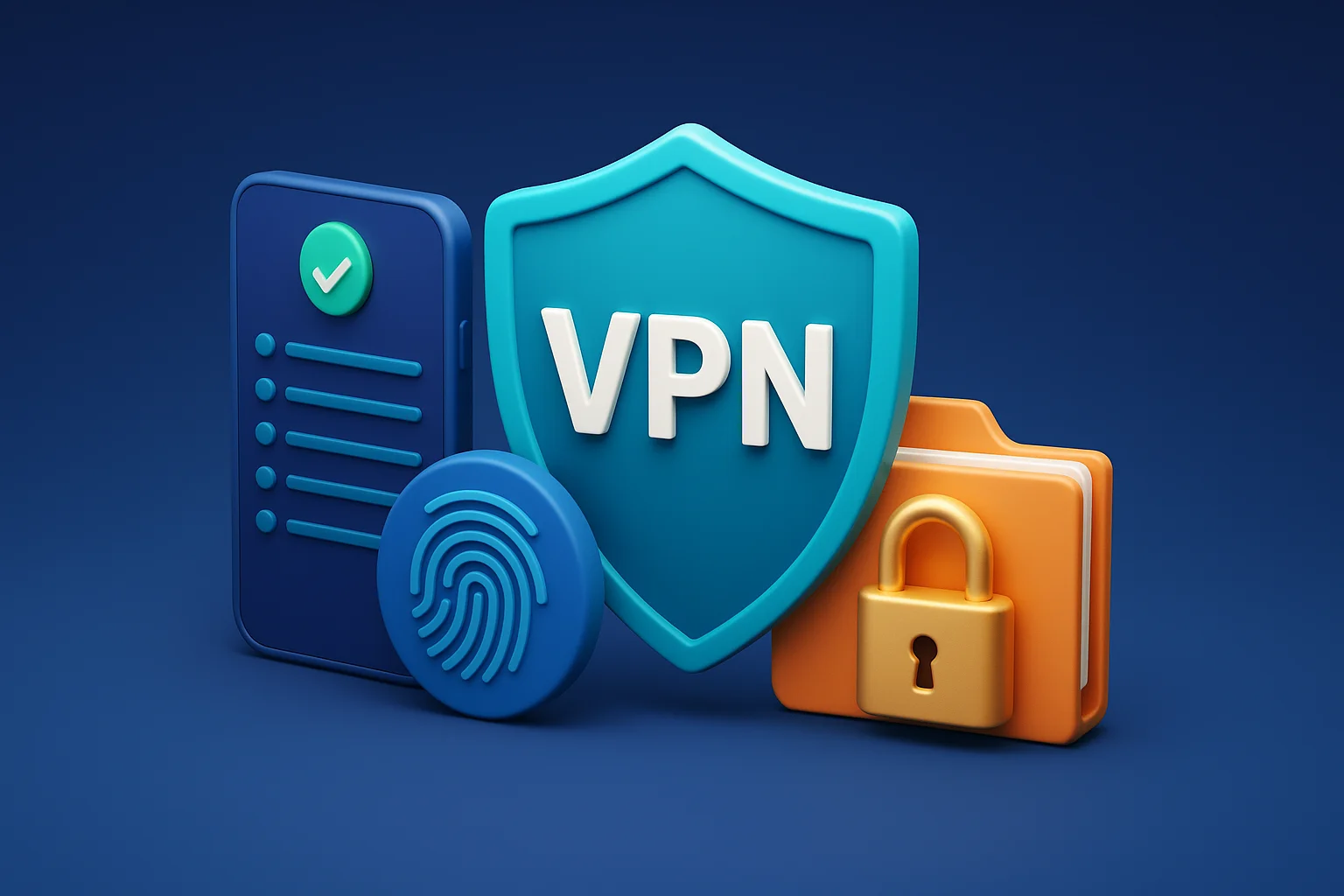
We tested each VPN with popular streaming services. NordVPN and ExpressVPN led the pack, reliably unlocking Netflix (US/UK/other regions), Hulu, Amazon Prime Video, and international services like BBC iPlayer. Surfshark and Proton also did extremely well on Netflix and Disney+; Mullvad and free VPNs struggled more. For new streaming services (Disney+, Paramount+, etc.), most above performed well. Note that unblocking can vary by server region; using the VPN’s smart or dedicated streaming servers often helps.
On devices, all picks have Android and iOS apps – important for an Android-focused site. (In fact, NordVPN and ExpressVPN were named the top Android VPNs in 2025 by experts.) All support Windows/macOS/Linux too, and many offer browser extensions or routers. Simultaneous connections vary: Surfshark and PIA allow unlimited devices, NordVPN allows 10, ExpressVPN 8, Proton up to 10 (on Plus plan), Mullvad 5. This means one VPN account can cover your phone, laptop, tablet, Smart TV, etc.
Pricing, Trials & Refunds
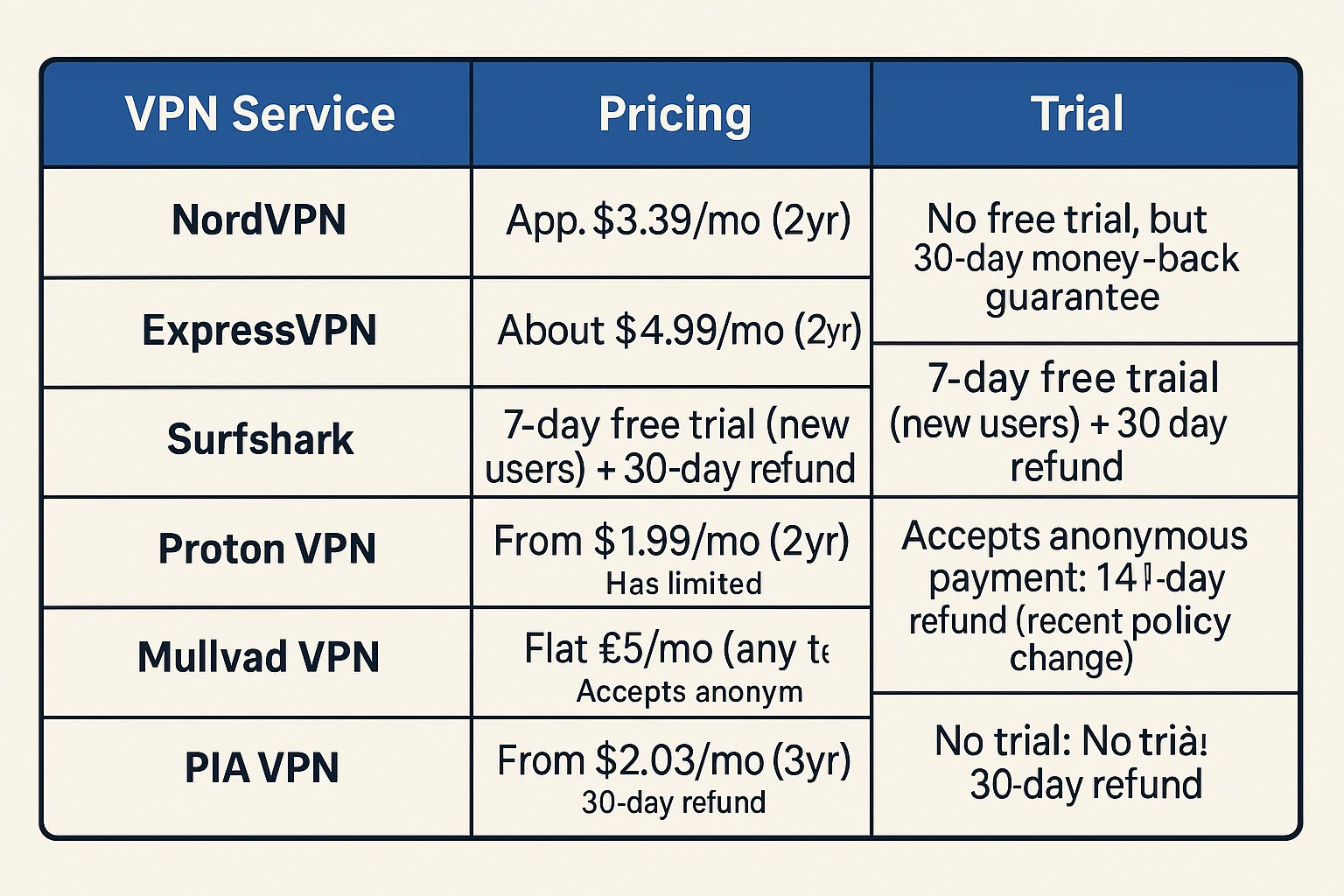
| VPN Service | Starting Price | Plan Length | Free Trial | Refund Policy | Notes |
|---|---|---|---|---|---|
| NordVPN | ~$3.39/month | 2 years | No | 30-day money-back | Frequently offers seasonal discounts |
| ExpressVPN | ~$4.99/month | 2 years | No | 30-day money-back | Premium tier with strong privacy |
| Surfshark | ~$1.99/month | 2 years | 7-day (mobile only) | 30-day money-back | Allows unlimited simultaneous devices |
| Proton VPN | ~$3.59/month | 2 years | Limited Free Plan | 30-day money-back | Best for privacy-conscious users |
| Mullvad VPN | €5 (~$5.26)/month (flat) | Any term | No | 14-day refund | No account or email required for sign-up |
| PIA VPN | ~$2.03/month | 3 years | No | 30-day money-back | Offers unlimited device connections |
All paid VPNs above offer at least a 30-day money-back policy, so you can test risk-free. (Surfshark even provides a short trial.) We recommend taking advantage of these guarantees to verify performance on your own devices.
Top VPN Picks by Category
| Category | Top VPN(s) | Why It’s Best |
|---|---|---|
| Best for Streaming | NordVPN | Flawless access to Netflix, Hulu, Disney+, and BBC iPlayer with high-speed global servers |
| Best for Speed | Surfshark | Recorded 950+ Mbps in speed tests; excellent for downloads, 4K streaming, and gaming |
| Best for Privacy | Proton VPN / Mullvad VPN | Secure Core, Tor over VPN (Proton); anonymous account & post-quantum encryption (Mullvad) |
| Best for Android | NordVPN, ExpressVPN | Feature-rich Android apps, stability, and excellent streaming & kill switch support |
| Best Budget VPN | PIA VPN (Private Internet Access) | One of the cheapest options with unlimited devices and strong no-logs policy |
| Best Free VPN (Limited Use) | PrivadoVPN Free, ProtonVPN Free | Privado: 13 countries, 10 GB/month; Proton: unlimited data but limited speeds and locations |
FAQ’s about Best VPN
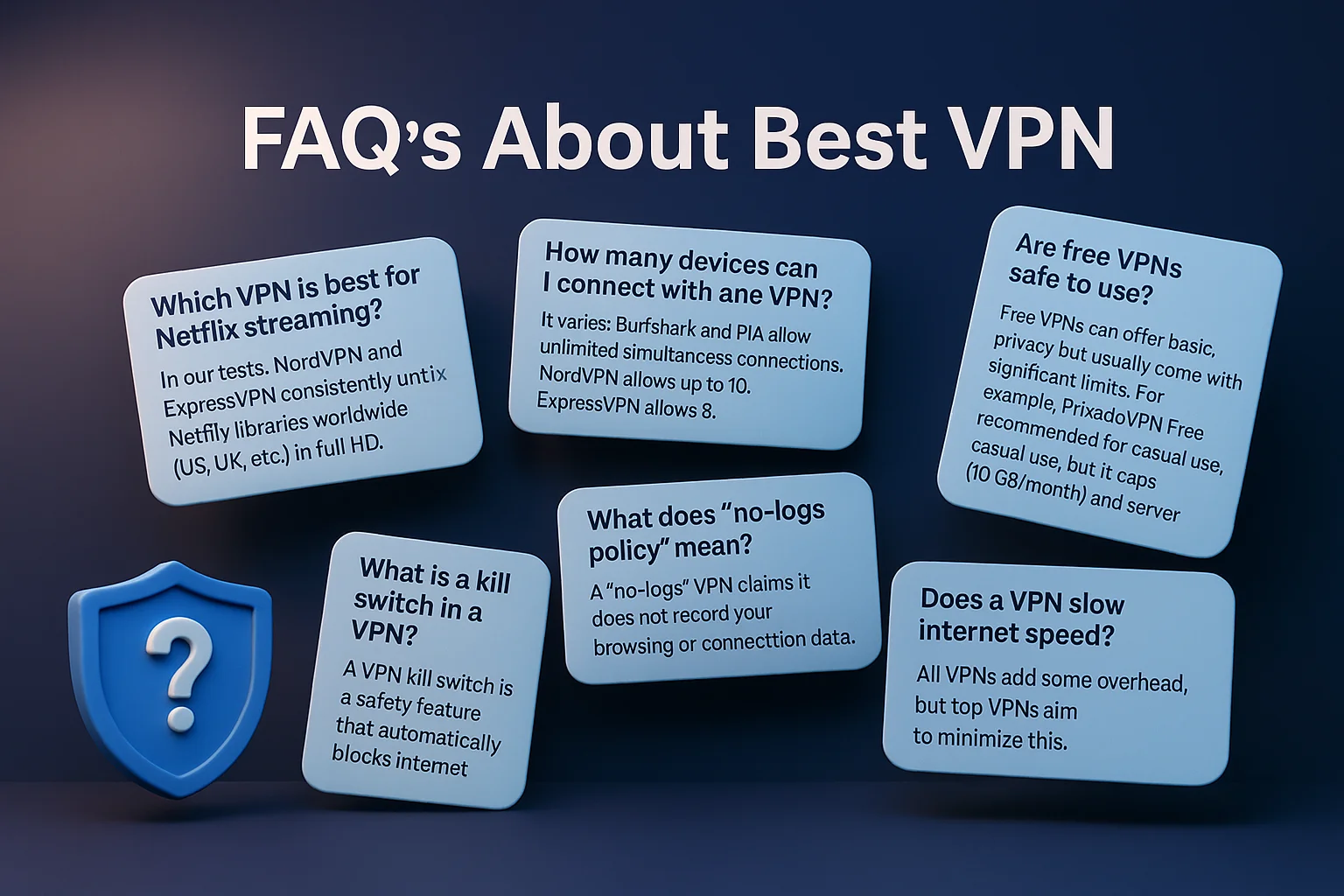
Q: Which VPN is best for Netflix streaming?
A: In our tests, NordVPN and ExpressVPN consistently unblock Netflix libraries worldwide (US, UK, etc.) in full HD. Surfshark and Proton VPN also work well. Fewer VPNs (like Mullvad) have trouble with Netflix. Choose a VPN that advertises streaming servers and has strong speed.
Q: How many devices can I connect with one VPN?
A: It varies. Surfshark and PIA allow unlimited simultaneous connections. NordVPN allows up to 10. ExpressVPN allows 8. Proton VPN (Plus plan) allows 10, Mullvad 5. Check the plan details; many VPNs let you cover all your home devices on one account.
Q: Are free VPNs safe to use?
A: Free VPNs can offer basic privacy but usually come with significant limits. For example, PrivadoVPN Free is recommended for casual use, but it caps data (10 GB/month) and server locations. Most free VPNs can’t match paid services in speed or unblocking. Some free VPNs (not discussed here) have questionable privacy practices. Generally, paid VPNs with audited policies (like the ones above) are safer for sensitive use.
Q: What is a kill switch in a VPN?
A: A VPN kill switch is a safety feature that automatically blocks internet traffic if the VPN disconnects unexpectedly. This prevents your real IP or data from leaking. All top VPNs (NordVPN, ExpressVPN, etc.) have a kill switch in their apps. It’s highly recommended to keep it enabled for security.
Q: What does “no-logs policy” mean?
A: A “no-logs” VPN claims it does not record your browsing or connection data. Reputable VPNs have this policy independently audited. For example, NordVPN’s no-logs policy was audited multiple times. This means the VPN provider itself cannot hand over your browsing history to anyone because it never stored it.
Q: Does a VPN slow down internet speed?
A: All VPNs add some overhead, but top VPNs aim to minimize this. In our tests, high-quality VPNs like NordVPN and Surfshark delivered up to 90–95% of base speed on nearby servers. Speed depends on your base connection, server location, and the VPN protocol. Generally, you’ll notice a slight drop, but it’s usually small on wired connections. For demanding tasks (4K streaming, large downloads), use a VPN known for speed (e.g. Surfshark).
Q: Is it legal to use a VPN?
A: In most countries, using a VPN is legal for personal privacy and security. It’s common in workplaces and by individuals. Some countries censor VPNs or ban them (like China or Iran), but even there many people use obfuscated VPNs to get around restrictions. Always follow local laws. In general, VPNs are a legitimate tool for security.

